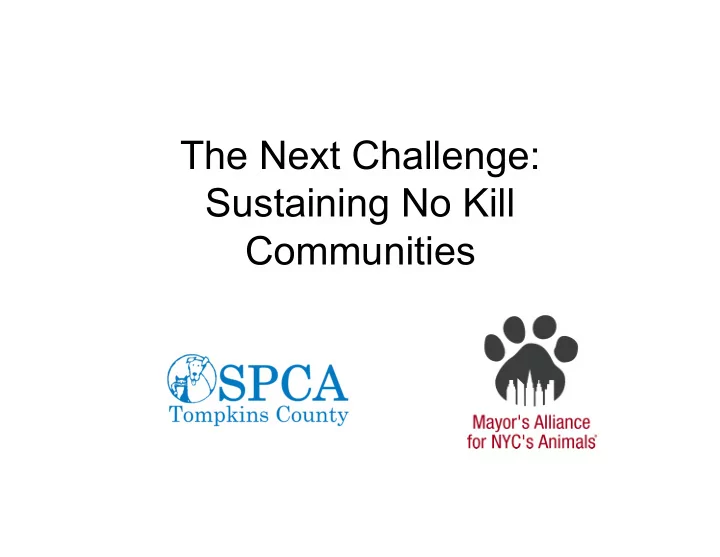

The Next Challenge: Sustaining No Kill Communities
• Physical size: 476 square miles • Human population: 101,136 (2008) • Number of households: 36,420 (2000) • Estimated pet population Dogs 25,567 Cats 28,844 (excludes feral/free roaming) • Annual shelter intake: 2,000 cats, 1,000 dogs • Per capita funding: $1.50
• Resolved to become No Kill in 1999 • Achieved success in 2001 • Maintained 92% or better live release rate for 9 years
Number 1 Challenge
Government Obstacles • Local: Animal Control Contracts – $1.50 per capita oughtta cover it, no? – We’re not paying extra for No Kill! – But our town only has a few dogs! – I’ll just hire a dog catcher…
Government Obstacles Working out Animal Control Contracts • What law requires/associated costs • Separate contract/agency budgets • Economy of scale • Fire station analogy • Advisory Board
Government Obstacles • County Support – Threatened annually • Representatives change • Budget cuts – Cat control??? Are you kidding us? • Why don’t we just shoot them… How can you convince the County to care about cats?
Government Obstacles Garnering County support • What is their responsibility? • What issues do they care about? • Identify an ally • Create an opportunity for collaboration that works for you and looks good on them SPCA and County Partnership 2010: S/N and rabies vaccination for stray and free roaming cats
Financial Challenges • Economic disaster of 2009! – Prioritize • Suspend non-revenue producing extras • Increase prevention efforts – Reorganize • Cross-train staff • Mind the details – Public Relations • Focus on the positive • Ask for help
Community Challenges Bad PR – You killed my dog! – You won’t take and keep all my feral cats! – You denied my adoption application! – You gave me a ticket! Counteract with good PR – Branding – Print/Radio/TV/Social media – Personal appearances
Community Challenges Every Summer: Too many animals! • Foster families • Volunteers • Cornell University Shelter Medicine Program • Annex/Off site events • Rescue Groups
• Physical size: 303 square miles (5 boroughs) • Human population: 8, 214, 426 (2007) • Number of households: 3,021,588 (2000) • Estimated pet population Dogs 1,779,000 Cats 1,673,000 (excludes feral/free roaming) • Annual shelter intake: 28,000 cats, 13,000 dogs • Per capita funding: $ . 89
• In 2005, received Maddie’s Fund grant, launched 10-Year Plan to become No Kill • By 2009, steadily reduced euthanasia to 33%, ahead of targets
Number 1 Challenge
Community Cats • Each year since 2005, Year 1 of our project, overall intakes have been reduced slightly. • Intakes of dogs has been reduced from 16,830 in 2005 to 13,333 in 2009. • But intakes of cats has risen each year , from 26,788 in 2005 to 28,379 in 2009.
Community Cats • New York City Feral Cat Initiative • Promotes community-wide TNR • Provides training, financial support and hands-on / coaching • Needs more funding to expand spay/neuter for community cats
Large Mixed-Breed Dogs Challenges • Vertical living • Unfriendly landlords / co-op and condo boards • Transportation
Public Housing Restrictions May 2009: New York City Housing Authority (NYCHA) revises pet policy – Reduced weight limit from 40 to 25 pounds – Banned Pit Bulls, Rottweilers and Dobermans
Public Housing Restrictions Scope of problem: • NYCHA Housing accounts for 8.4 % of NYC’s rental apartments • Home to 4.8 % of NYC’s population • 334 public housing developments with 178,556 apartments, housing approximately 403,665 authorized residents • 654,657 New Yorkers are served by NYCHA's Public Housing and Section 8 Programs • If NYCHA were a city, it would rank 20 th in population size in the US
Public Housing Restrictions Consequences of revised policy: • 241 dogs relinquished to AC&C (April 1, 2009 - April 6, 2010) – 72 killed – 137 transferred to rescue partners or adopted – 24 returned to owner • Those dogs took up space that could have been used by other dogs • Lost adoptions to potentially thousands of NYCHA households
Health of Dogs & Cats at AC&C Shelters Large urban shelter with annual intake of about 42,000 cats and dogs Challenges: • Budget cuts • Medical Director • Effect on rescue partners
Transport • Wheels of Hope Transport vans have been crucial to moving animals out of AC&C shelters to partner rescues • In 2009, our 4 vans transported almost 7,000 animals • Need to ensure we can sustain transports for future
Consistent Adoption Locations • Retail space and construction in NYC is extremely expensive • Limited open space for events • Depending on the kindness of strangers…
Mobile Adoption Vans!
QUESTIONS?
Recommend
More recommend